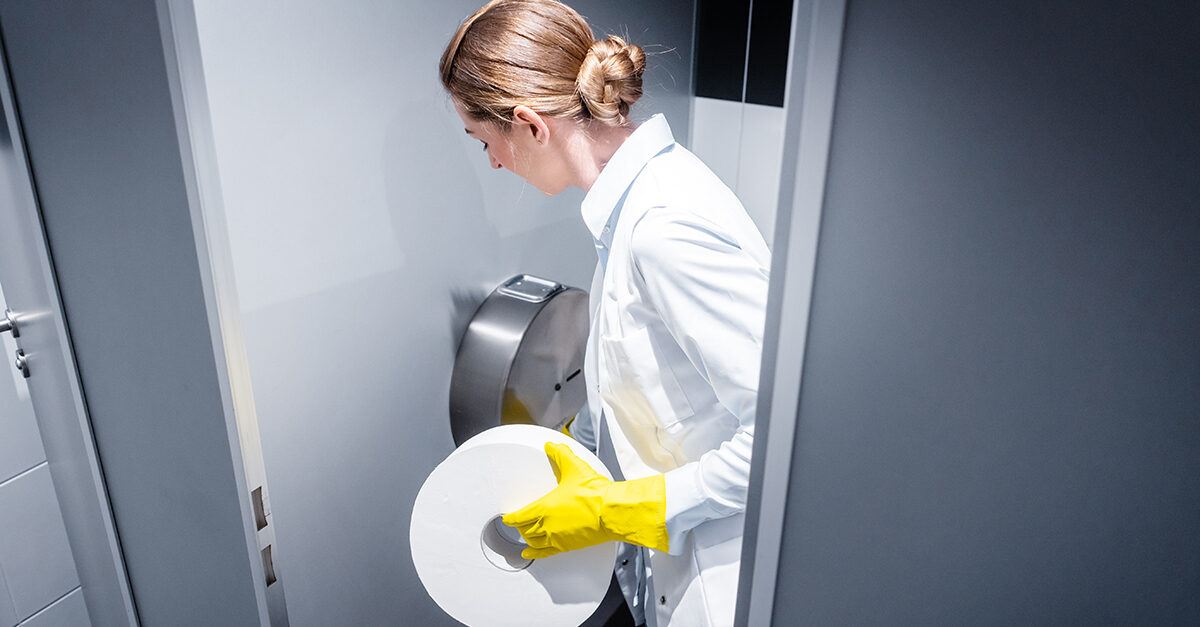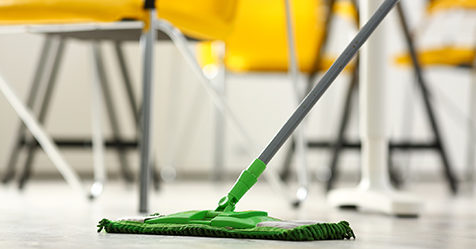As a facility manager or cleaning supervisor, your No. 1 goal is to keep your building clean and safe for those who enter. But how do you achieve a healthy facility when it’s cleaned only once a day? If you desire a better facility image with both appearance and health in mind, it may be time to consider scheduling daytime cleaning services or employing a day porter. This article will help you understand the unique role of a day porter and how it can benefit your organization.
What is a day porter?
A day porter is a person stationed in a facility(s) to assist in daily cleaning-related duties. Day porters work during a facility’s regular work or business hours and attend to cleaning needs as they arise. The porter should be a professionally trained cleaner with knowledge of best practices for proper disinfection. Recognize a day porter as a customer-facing team member who represents your department. Because of the nature of the job, an inherent helpfulness and positive attitude are key to this team member’s success.
How does policing fit into day cleaning?
Policing is a term associated with day-porter duties. To “police” means to assess cleaning needs in real-time and perform a spot cleaning when a full cleaning is either not necessary or not possible. Typical policing tasks include the word “spot” in the job description (e.g., spot sweep, spot wipe, spot mop, spot-clean mirrors and sinks, clean and refill high-use facility areas—or spots).
How do night cleaning and day cleaning differ?
Typically, organizations schedule daily cleaning after hours when the building is empty or at its lowest staffing levels. With few or no occupants around, the cleaning team can perform their work unhindered as they move through the space. Additionally, they may perform some wet tasks that bring a risk of slip and fall accidents, like floor mopping.
Day-cleaning porter duties may include touching up restrooms; restocking consumable paper and soap supplies; policing entryways and public areas; changing light bulbs; picking up debris in smoking areas; checking cafeterias and coffee stations; cleaning up spills; disinfecting high touchpoints; cleaning glass; and other cleaning tasks that are specific to the occupants’ use of the building.
The day porter doesn’t replace scheduled after-hours cleaning but works in conjunction with the nighttime cleaning team to help provide cross-shift continuity. This results in a fully integrated cleaning solution.
Why is a day porter necessary?
To help with infection prevention—One of the greatest reasons to implement a day porter or daytime cleaning solution is to help prevent the spread of infectious diseases such as COVID-19, the flu, or other illnesses caused by pathogenic microorganisms in your building. A day porter can provide repeat cleaning and disinfection of high touchpoints that are key routes of germ transmission and are at higher risk of contaminant buildup.
To boost your facility image—Improving facility image is a top concern for facility managers, according to the 2022 CMM Facility Management Benchmarking Survey, ranked only behind health and safety. It is good for business to have your space clean, safe, well-stocked, and looking presentable all day long. A day porter can ensure high-traffic areas stay clean during busy hours. In addition to keeping bathrooms clean, a day porter can ensure they are stocked with soap, toilet paper, and other necessary items. A day porter contributes to first impressions of your facility by cleaning up any debris and dirt tracked in by people and consistently checking breakrooms and waiting areas to make sure they are neat and tidy.
To improve public perception of cleanliness—Countless consumer surveys conducted in the past two years have shown that COVID-19 has changed public perceptions and expectations for facility cleanliness. Even though there may not be strict health regulations or health codes necessary for your building, the public expects it to be clean. Perception of cleanliness directly affects consumers’ choices. If a facility doesn’t look clean, the public may decide not to return.
A day porter can be especially helpful in facilities that are open more than eight to 10 hours a day like big box stores, convenience shops, grocery stores, and medical facilities. When a building never closes, it’s unlikely that one overnight cleaning will keep it tidy and healthy.
What are the outcomes of day cleaning?
When properly planned and executed, there are many benefits of daytime cleaning, such as enhanced trust with your building occupants and improved consistency of cleaning results. In addition, properly workloading the daytime cleaning tasks and prescribing the correct tools will minimize unnecessary interruptions in the workday.
Day porters are often the customer-facing cleaning heroes of a facility. Their work helps support the image of your facility and ensures that building occupants are safe and satisfied.




